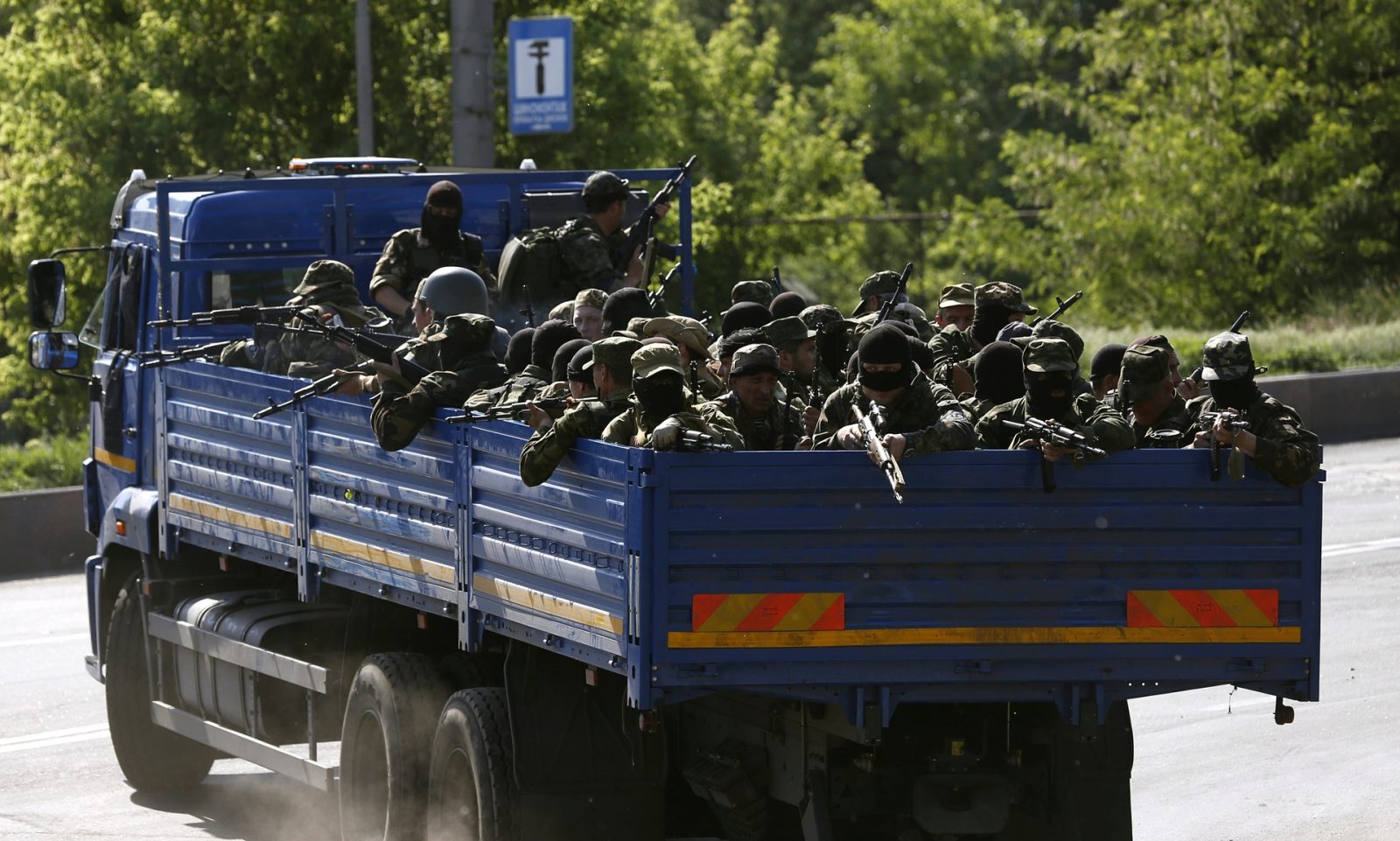Russell Bentley arrived in Donbass in December last year, convinced that the future of humanity depended on the Russia-backed rebels defeating the Ukrainian army – whom he describes as “CIA-backed Nazi scum”.
“This is the hope for the future of the world,” said the 55-year-old Texan, during a recent interview in Donetsk, his unlikely new home. “Because if Donbass falls, and the fascists are right on the borders of Russia, once nuclear weapons start shooting it ain’t just going to be one or two, it’s going to be all of them, dude, and that’s it for all of us.”
Bentley’s road to Donbass has been a winding one. Born in Austin, Texas, Bentley served in the US army for three years, stood for Minnesota senator on a marijuana legalisation platform in 1990, and later spent years in a US prison for smuggling hundreds of kilograms of marijuana over the Mexican border.
He first took an interest in Ukraine last year. Working as a tree trimmer in Austin, he followed the Maidan protests of early 2014 on alternative news websites and believed them to be “obviously completely bogus from the get-go”. In June last year he saw a video of the aftermath of a Ukrainian air attack on a building in Luhansk.


When I saw that, I cried. I said: ‘I’m going there and I’m going to kill some of the motherfuckers that did that.’ And I have.
There are foreigners supporting both sides of the lines in the Ukraine conflict, with a number of Europeans enlisting in the far-right Azov battalion fighting for Kiev. Chechens have also fought on both sides, and the introduction of regular Russian forces at key moments is widely seen as a decisive factor in the military outcome, despite continued Kremlin denials of their presence.
But less catalogued is the motley collection of foreigners from further afield swelling the ranks of the Donetsk and Luhansk separatist forces. The region has become a hub for those who believe the world is in the grip of a conspiracy, with the CIA, the masons, corporate capitalism or Zionism to blame, and believe the Kremlin and the Donbass rebels are the last line of defence.
Nobody knows exactly how many foreigners are fighting with the rebels, but sources say they believe there are “hundreds” of them, hailing from as far afield as Colombia, India and Brazil, all of them keen to fight the “fascists” they believe are on the Ukrainian side.
The Fifteen brigade is particularly known for its foreign fighters, and on a base on the outskirts of Donetsk, a Scottish man in his 30s was preparing to travel to the front line earlier this week. The man, who asked not to reveal his name nor the town he was from in Scotland, said he had left a job and a girlfriend behind to come and fight for the rebels several months ago.
“I always wanted to join the British army but couldn’t because of an injury. So when I had the chance to come and fight, I took it,” he said. He said if the British army ever got involved in the conflict in Ukraine he would go home immediately, as he would not be able to fight against British soldiers.
He said he had voted no in the Scottish independence referendum. “A lot of the local fighters are surprised when I say I voted no, and try to persuade me that Scotland should be independent, but I’m a British patriot.”
His parents do not know he has gone to east Ukraine to fight and think he has gone backpacking, hence his nom de guerre, the Tourist.
While the Tourist is fulfilling long-held dreams of being a soldier, most of the other foreign fighters came for ideological reasons. Ravi Singh, 24, an Indian communist who spent four years running an Indian restaurant in Christchurch, New Zealand, arrived in Donbass four months ago after reading about the conflict online and believing it was provoked by the CIA.
“I will stay here until we win,” he said, wearing rebel fatigues over dinner at a central Donetsk cafe, having been granted an evening away from the barracks. “The Ukrainians are cowards, they won’t fight face to face, they drop bombs behind us on civilians.”
It is not only those who want to pick up a gun who have been attracted to the Donetsk cause.
Janus Putkonen, a Finn who has run a radical online newspaper for many years, first came to the region on an organised tour and decided to stay, setting up an English-language news agency reporting from the territory. He said he was drawn to Donetsk because it is a unique opportunity to stand against western imperialist aggression.
“As goes the Donbass so goes the world. This region is preventing a third world war. That’s why I’m here,” he said. “It’s very possible that Donetsk will be the first country in the world to have a new kind of central bank, and it will be an evolution of the world system.”
When Bentley arrived in Donetsk, the immediate suspicion among the rebels was that he could be an American spy. He defused the tension during a six-hour interrogation when the local security services asked him if he believed the US government was involved in the 9/11 attacks.
“I said of course I believe that, only a fool wouldn’t. Only idiots and liars say that was not an intentional controlled demolition.”
With that, he was inducted into the Essence of Time battalion, and spent several months on the frontline. A few months ago, he left the front and is now working at the news agency with Putkonen, where he produces a weekly radio show about the Donbass. He now speaks some basic Russian, but initially the language barrier was immense.
“At the first position I was basically operating by vibes. When I heard the guys start yelling or talking on the radio a lot, then I knew we were ready to start shooting.”

Language is a big issue for most of the foreign fighters. The Tourist said even when he is with the few members of his battalion who speak English, they struggle to understand his Scottish accent, and much of the coordination in battle was done by hand gestures.
Another major problem for many of the fighters is how to leave rebel territory. Most arrived in Russia on short-term tourist visas that have long since expired, and so can not cross back to Russia. A spokesman for the Ukrainian foreign ministry confirmed that any foreigners fighting who crossed into Ukraine-held territory would be arrested and charged, at minimum, with taking part in illegal armed formations, which carries a hefty jail sentence.
Javier Benítez, a 24-year-old doctor from Badajoz in Spain, arrived in Donbass in February and has been based near Luhansk, treating civilians and rebels. He is tired of the conflict zone and wants to go back to Spain to sit medical exams, but his Russian visa has expired. The Spanish embassy in Moscow advised him to leave via Ukraine, but although he claims he did not fight, his illegal entry into Ukraine and medical help for the rebel fighters could still land him in serious trouble.
Bentley thinks he may have found the solution to the problem, and plans to compose a letter to the Russian president, Vladimir Putin.
“I’ve spilled Nazi blood on this ground, and I’ve spilled my own blood on this ground, so I am going to ask Putin for Russian citizenship,” he said.









